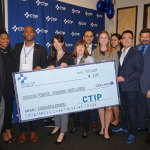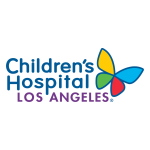Children’s Hospital Los Angeles Hosts CTIP Accelerator’s Symposium on the Los Angeles MedTech Ecosystem

The West Coast Consortium for Technology & Innovation in Pediatrics (CTIP) awards $250,000 in seed grants to catalyze pediatric innovation
LOS ANGELES–(BUSINESS WIRE)–The West Coast Consortium for Technology & Innovation in Pediatrics (CTIP), centered at Children’s Hospital Los Angeles (CHLA), presented its 2019 Symposium on “The Los Angeles MedTech Ecosystem: Spotlight on Pediatrics,” bringing together the community’s brightest innovators, clinicians, entrepreneurs and engineers. The symposium featured panelists, speakers and attendees from prominent organizations including Keck Medicine of USC, Cedars-Sinai, University of California Los Angeles, the Lundquist Institute (formerly LA BioMed), IBM, Grid110, ScaleLA, the SBDC, and the Office of Los Angeles Mayor Eric Garcetti.
“We are thrilled to be hosting some of the most innovative minds and institutions here at Children’s Hospital Los Angeles as we rally around the united goal of improving health outcomes for children through medical technology development,” says Juan Espinoza, MD, FAAP, Medical Director of the Innovation Studio at Children’s Hospital Los Angeles and Director of CTIP. “CTIP is committed to supporting and fostering collaboration amongst the finest institutions on the West Coast to identify and cultivate promising new technologies tailored to the needs of children.”
The symposium also featured product demonstrations and an awards ceremony with check presentations for the winners of CTIP’s third Catalyzing Pediatric Grant competition, which bestows $250,000 in seed grants to accelerate projects specifically designed to improve the safety and delivery of care to infants and children. Seven innovators developing novel devices and technologies for pediatric patients were selected as winners this year and received $30,000 – $45,000 each. Applicants included device projects covering 18 different pediatric subspecialties from 20 states.
“This was our most competitive innovation competition to date,” said Kathryne Cooper, MBA, Co-Director of CTIP. “With over 100 applications of diverse and transformative healthcare solutions reviewed, we were impressed by the caliber of these technologies and their potential impact on patient outcomes.”
This year’s grant winners are as follows:
Clinical research for breakthrough sickle cell diagnostic device – Hemex Health has developed an affordable, accurate, and compact testing platform for the millions of people who are at risk of malaria and sickle cell disease and lack access to viable diagnostics.
MiniMagnamosis: Transforming Neonatal Esophageal Atresia Repair – UCSF Surgical Innovation within UCSF’s pediatric surgery division has created tiny, specially shaped magnets that form a magnetic compression anastomosis to provide babies born with esophageal atresia with a continuous esophagus, allowing them to eat and drink on their own for the first time.
OmniJect – Alerje, Inc. is building an IoT phone case that holds a slim epinephrine auto-injector that, when used during emergencies, alerts user’s CareCircle with location info via a mobile app.
Preclinical study for dynamic monitoring of VP shunt status using patented implantable microsensors – Senseer LLC is developing a multi-sensor module, MultiSense, that can be put in-line with already approved, implantable devices such as catheters or shunts, ultimately allowing for remote monitoring of device performance and, with that, timely intervention before severe and costly-to-treat symptoms arise due to device failure.
Smart Otoscope – Cactus Medical has developed a one-touch otoscope that uses light spectroscopy to automatically indicate middle ear effusion (indicative of ear infection) in 1 second during standard otoscopy.
A Smart Pacifier for Objective Behavioral Assessments of Infant Hearing – BrainChild Technologies, LLC is improving early identification of hearing loss in infants through a low-cost smart pacifier.
Ultrawide-Field Ultrahigh-Speed Optical Coherence Tomography for Retinopathy of Prematurity – OHSU Casey Eye Institute has built an artificial intelligence enabled 3D retina scanner for imaging premature babies with blinding eye disease.
CTIP, a collaboration of Children’s Hospital Los Angeles and the University of Southern California, accelerates the development of novel pediatric medical devices from concept to commercialization. Pediatric patients have long been an underserved population in the technology space, with many having to deal with ill-fitted medical devices and a lack of access to effective diagnostic or therapeutic devices. From 2013-2018, CTIP supported 120 unique projects from 15 different states. Since being awarded a $6.6 million Pediatric Device Consortium grant by the U.S. Food and Drug Administration in September 2018, CTIP has supported 43 new projects and seeded $525,000 in grant funds to pediatric medical device innovators.
To learn more about CTIP, visit their website at https://www.westcoastctip.org/.
About Children’s Hospital Los Angeles
Founded in 1901, Children’s Hospital Los Angeles is ranked the top children’s hospital in California and fifth in the nation for clinical excellence with its selection to the prestigious U.S. News & World Report Honor Roll of children’s hospitals. Clinical care is led by physicians who are faculty members of the Keck School of Medicine of USC through an affiliation dating from 1932. The hospital also leads the largest pediatric residency training program at a freestanding children’s hospital of its kind in the western United States. The Saban Research Institute of Children’s Hospital Los Angeles encompasses basic, translational and clinical research conducted at CHLA. To learn more, follow us on Facebook, Instagram, LinkedIn and Twitter, and visit our blog for families (CHLA.org/blog) and our research blog (ResearCHLABlog.org).
Contacts
Media Contact: Lauren Song
Office: (323) 361-3614
E-mail: lasong@chla.usc.edu


